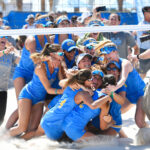Chapter 6: Lives Transformed
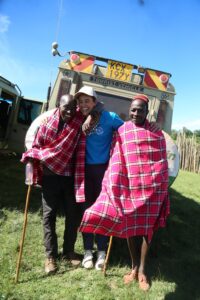
As I sat at breakfast sippin on my Kenyan tea replaying yesterday’s activities, I was struggling to pick my favorite moment of my journey here in Kenya. I mean, I planted a tree for the first time in my life, who would’ve thought it would be over 19,500 miles away deep in Kenya among the Morijo village. I joined the Olemegili tribe in their traditional warrior ceremonial dance.
I got to see eyes that lit up the sky as I handed out balls, nets, and even brand-new Bibles to all the Morijo & Loita school boys. But I as I kept thinking, I’d have to say my favorite part of the entire day was seeing the pure joy on the children’s faces as they huddled around the court, screaming cheering, and laughing with their schoolmates! It continues to amaze me what joy a net and ball can bring for a child.
As I took one last big sip, Katie, our amazing manager, rolled through the schedule for the day. We would be paying visits to the Oltarakwai and Olemegili villages. Here we would see up close the work World Concern does to help “transform” lives.
We herded like cattle back into the Landcruiserss. Our three-hour drive led us to the first village we would be visiting, called Oltarakwai. Oltarakwai has been working closely with World Concern since 2010. As we made our way down the dirt road, little kids were waving, some you could tell were on the more curious side. As we reached the end of the road, we were met with a warm welcome from the village leader and key members of the Oltarakwai tribe. As I was approaching the chief to extend my hand, I quickly darted back into my memory file to recall what “Hello/Goodbye/Thank You/ and God Bless You” were in their native tongue. Right as I shook his hand it came to me! I said, Supa! He immediately grinned and replied, “Ipa” as he pulled me in kissing my left and right cheek:)
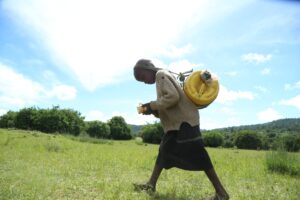
Since World Concern stepped in over a decade ago, one of the biggest improvements in the Oltarakwai village has been their access to clean water. Today we were about to see that transformation for ourselves.
After prayer and introductions, the village leaders guided us over to what I would have called a marshy swamp. I climbed up a small hill to look and what I saw was shocking. I was peering down at what was murky brown water, covered by an oily sheen, algae, mosquitoes, and countless other insects scurrying all over the small body of water. This water was not fit for any human, let alone any animal. This was Oltarakwai’s main water source for the community, including four other nearby villages, as well as their livestock. As you can imagine, cooking, bathing, and drinking with this water came with major complications.
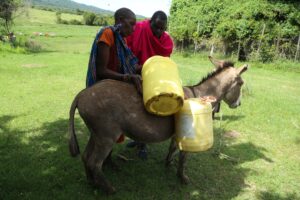
They would often suffer from stomach ailments and typhoid. If they wanted cleaner water, they had to trek 18 miles to a river that was located up and over a mountain. Trekking, not driving, with or without a donkey, over steep terrain to carry the water.
I couldn’t imagine drinking this water, nor walking 18 miles with heavy jugs of water to sustain myself and my family. As I stood there peering at the water, I choked up as I thought about my own life. I’ve never feared access to water. Clean water was immediately available with the turn of a faucet, or the swipe of a credit card. Clean water was always right in front of me, or around the next corner. It was always easy and readily accessible. We take that for granted, like so many other “comforts of life,” when so many live and suffer in dire circumstances.
As I gathered myself, I was guided by village members to an area close to the swamp. We were standing in front of a faucet where a women was filling up her yellow jugs with clean water. With the help of World Concern, a well was dug, and a solar powered water filtration system and 500-gallon water storage tank had been installed in 2018. This immediately changed their lives forever. This meant no more typhoid or stomach diseases, no more sharing water with their livestock, and no more 18-mile trek to get clean drinkable water. For countless generations, clean drinkable water was available only 25 feet underground. What they lacked were the tools and resources to access the water, and the technology to make it readily available.



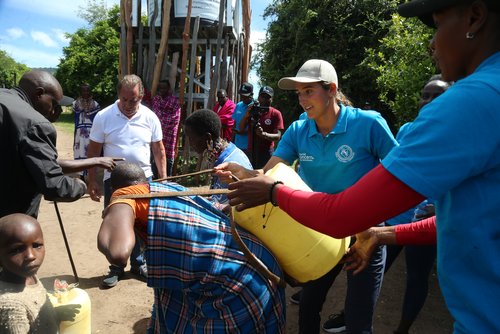
As I helped a woman from a neighboring village fill up one of her yellow jugs, I really began to see the magnitude of the work World Concern was doing. People helping people. People connecting people. The villagers now share that water source with neighboring villages that had the same problems and challenges in accessing clean water. Neighboring villages that had little interaction between one another now share clean water and have come together and developed a variety of community programs to aid one another where the need arises. People helping people. People connecting people.
From there we were led across the field to take a tour inside one of their manyattas. (A manyatta is the name of their hut.) The manyatta was about a 200 square foot clay hut, with three bedrooms, no bath, no toilet, no windows, and zero amenities. They took my hand and right when I took my first step into the entry way I was hit by an overwhelming smell of smoke, it was the smell of burning firewood. My eyes began to water. As I struggled to make small discrete inhales, I took no more than a step and I was standing in what they called their “sitting room.” The sitting room was no bigger than the size of two door mats. We took a step past the sitting room and right in front of us was a wooden slat door. Here was the area where their livestock stayed at night. Their sheep and goats lived inside the hut with the family to avoid cold and wet weather, and to keep them safe from predators.


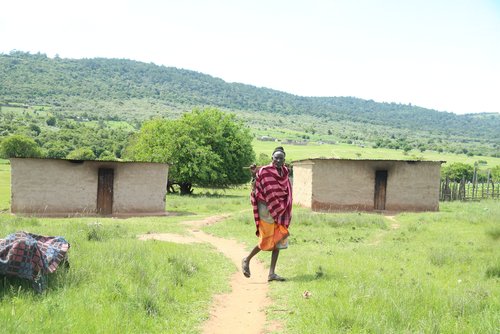
As I turned right past the livestock sleeping quarters, I quickly ducked into a room full of utter darkness. Without the small help of a tiny handheld solar light provided to the villagers by World Concern, I would not have been able to make out the contents of the rest of the house. From there I was guided to a small room with a bench where I sat. Right in front of me was the “kitchen.” This small sitting area and “kitchen” was effectively the communal heart of the house. If you weren’t tending to livestock in their quarters or sleeping, this 8’ by 8’ area was your entire family living area. The kitchen was in the center of this area and consisted of a single 1’ by 1’ fire cooking area. Think about a campfire here with no ventilation. To the right and left tucked into what resembled little caves in the wall, were three small beds. As my eyes tried to adjust, without the small glow of the burning firewood, I would have missed what I made out to be three small children cuddled up in the corner below one of the beds. That was it. That was the end of the tour. I sat there trying to take it all in.
I thought to myself. No electricity, no air conditioning, no bathroom, no hot running water, no table, no bedrooms, no place to relax and watch a Netflix show, no refrigerator with my favorite snacks. This put my life into perspective very quickly.
As we made our way back to the Landcruisers I was told they wanted to leave me with two things before I left.
– One was a copy of their “Annual Strategical Plan” including the changes they want to see and goals they have for their community in the next 10 years. These people began to see value in themselves and a new hope for a brighter future. They were proud of what they accomplished but have set much bigger goals for themselves:)
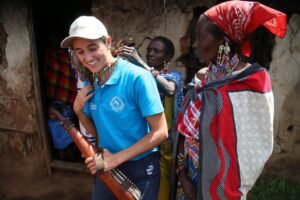
Lastly, they brought out a beautifully beaded necklace that they tied around my neck. I was overcome with joy. If there’s one thing that the people of Kenya continue to show me, is their love and kindness for everyone.
As it was secured around my neck, I couldn’t leave without giving them a little token of “thank you” in return. I pulled out of my bag a hand full of USA pins and went around and individually clipped one on each of the member’s garments. As I took a step back and looked at all 12 of them smiling with their new American flag pins I thought, “Man, God is so good.” As much as this was a trip to see the work World Concern was doing and to help bring hope to some of the most vulnerable kids in Kenya through Sport, it was a trip of fellowship. With the love of God in our hearts we are able to love all people. And the Oltarakwai tribe did just that.
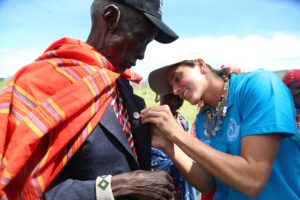
With the love of God in our hearts we are able to love all people. And the Oltarakwai tribe did just that.
We all packed up into the Landcruisers with hearts full of love and began to make our way back out to the main road. After a quick bite to eat we were on our way to visit the Olemegili village. Our Landcruisers turned left on a red dirt road where we were met with a road with a fierce upward trajectory. It comes to find out Olemegili is the highest point in Western Kenya. As our vehicle crept ever so slightly up the mountain, we finally reached the top. The view was unlike anything I’d ever seen. I felt like I was transported back in time to the set of “The Sound of Music.” I turned to Katie and said, “The Hills are Alive!” Now I didn’t start singing cause, well, I don’t have a voice like Julie Andrews!
The top of the mountain revealed a valley full of the greenest grass, and hills that rolled on for miles. And there were little kids tending to small herds of sheep and goats, smiling, and waving as we passed by. As we pulled up, no more than a minute went by and I began to hear a faint chanting in the background. I turned my head and a group of eight ladies were dancing towards us, As they inched closer one grabbed me by the hand and I thought, “Ok I’m doing this!” They all grabbed our hands and invited us to join in the rhythmic dance. If this trip has taught me anything, it’s that dancing is not my strong suit. But nonetheless I embraced my awkward dancing and bounced to their chant until we were seated in front of their church to make formal introductions.
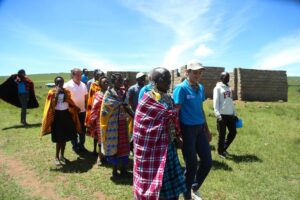
But nonetheless I embraced my awkward dancing and bounced to their chant until we were seated in front of their church to make formal introductions.
World Concern has been working with Olemegili for over 10 years and with the help of their program SALT. SALT (Savings And Loans Transition) is a program developed by World Concern to help villagers develop skills on how to save, develop emergency funds for the village, and set money aside for bigger projects within their community. To me, that’s the beauty of World Concern’s holistic approach. Instead of going in and giving the villages what they need, food, water, and other needs, they equip them and train them in new skills to help them meet those needs on their own. This empowers them and allows them to be proud of the positive change within their own community.
Now in case my dancing wasn’t atrocious enough already, the women grabbed us all by the hand one last time. As I bounced up and down trying to keep myself in rhythm, they gifted me with a beautiful hand-beaded necklace. The dancing subsided and I’m thinking to myself, “Never in a million years would I have thought I’d be hand in hand dancing with the Olemegili tribe on the rolling hills like the ones in “The Sound of Music.”
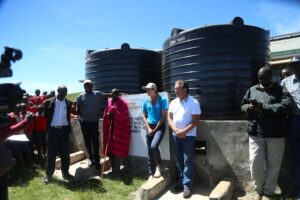
We eventually made our way over to the primary school not more than 50 yards away. The primary school started back in 2002 with only one teacher and 35 students.
With the lack of accessible clean water, it was getting hard for the village to ever dream of increasing that number of students or teachers. When World Concern stepped in in 2010, they have seen many changes, one including a water well pumped by solar. Today, the school has over eight teachers and 250 students. From partnering with World Concern, they now have access to clean water. They have a five-acre fresh garden to feed their students as well as clean latrines. With them they have seen access to greater education, increased business opportunities and have seen massive improvement with crop and livestock farming.
Our last stop in the village we were led to a quarter-acre plot of land where an Irish potato farmer and his family resided. He was one of the best farmers in the Olemegili village and has been teaching other people about his craft. With the guidance and tools given to him by World Concern, he has seen a dramatic increase in the number of potatoes per plant, going from about three to over twenty potatoes per plant. This has been such a positive change for his family as well as the village.


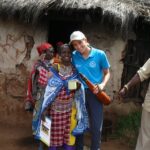


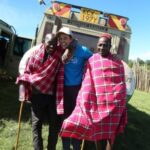
We said our goodbyes and we headed three hours back towards Narok for the last night of the trip. With these long rides, I’ve had lots of time to think, and reflect. Though I was physically, mentally, and emotionally drained, my heart was the fullest it’s ever been. This week opened my eyes to see real-life challenges I’ve never had to face in my own life. But the one thing I’ve noticed throughout it all was the joy these people still found in the midst of such circumstances. They’ve shown that no matter what, the love of God and the love for people are what matter most:)
As I crawled up the stairs and wiggled into bed, I was the most tired I’ve been in years, but man I didn’t want to sleep, I didn’t want this trip to end.
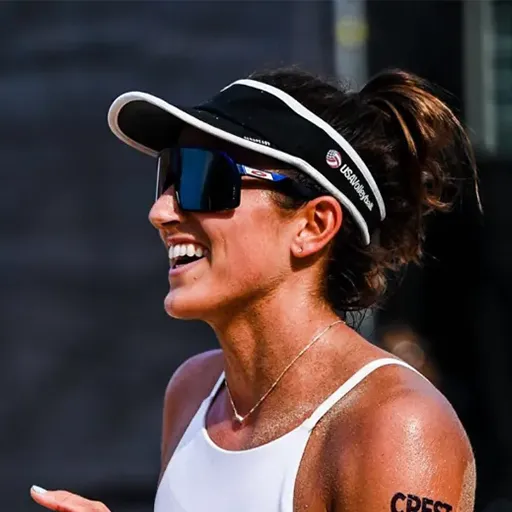
Sarah Sponcil is a prominent figure in the world of professional volleyball, known for her exceptional skills, work ethic and achievements on the court. Born on August 16, 1996, in Phoenix, Arizona, Sponcil began her volleyball journey at the age of three and has been showcasing her immense talent and dedication to the sport ever since.
Garnering three high school state championships in Arizona, and two NCAA national championships at UCLA, Sponcil’s career reached new heights when she represented the United States at the 2020 Olympic Games. At 24 years of age, Sponcil became the second youngest beach volleyball player to ever represent Team USA in the Olympic Games and, together with her partner Kelly Claes, were the youngest beach volleyball team to ever represent Team USA in the Olympic Games.
Following her Olympic success, Sponcil has continued to excel as a professional volleyball athlete, earning numerous accolades and recognition for her prowess as both an indoor and beach volleyball player. Her versatility, athleticism, and relentless determination has solidified her reputation as one of the top players in the sport and make her a force to be reckoned with on any volleyball court.
Off the court, Sponcil is known for her humility, work ethic, and commitment to her faith, family, and desire to inspire the next generation of athletes. She serves as a role model for aspiring volleyball players worldwide, demonstrating that with passion, perseverance and dedication, anything is possible in the world of sports.
Search Posts
Categories
Latest Releases
Beyond Skill: What does leadership mean to you?
Championship Team: Lessons from Faith & Sports
I’ll Be Home For Christmas
Search Posts
Categories
Latest Releases

